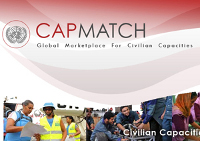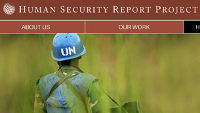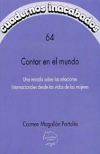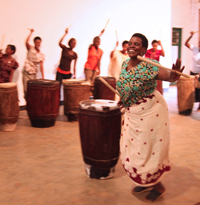Recommendations
More Recommendations
-

CAPMATCH: online platform for exchanging experiences in post-conflict situations
https://capmatch.dfs.un.org/Capmatch/
The new online platform called Global Marketplace for Civilian Capacities (in short: CAPMATCH), launched by the UN in September this year, allows both governmental and non-governmental organizations to share post-conflict transition experiences, in order to learn more from policies and peacebuilding strategies which have been put in place so far.
CAPMATCH, which forms part of the UN Civilian Capacities Initiative, aims to capture experiences from all over the world, with a particular focus on "the global South". Stressing that there is no single model for institution-building, organizations are recommended to look at numerous different types of experience and to adapt these to their own local contexts.
Examples of CAPMATCH experience exchanges include Liberia requesting support in implementing its national capacity development strategy or Cote d'Ivoire offering to share its experience of its first post-conflict election process while at the same time asking for expertise to continue to build the functions of its independent electoral commission.
Aiming to address areas in which expertise is in high demand, the platform prioritises: safety and security (including community violence reduction, disarmament and demobilization, mine action, police, protection of civilians, security sector reform, and transnational crime and counter-terrorism), justice (incl. criminal justice, judicial and legal reforms and transnational justice), core government functionality, economic revitalization, and inclusive political process.
Clearly, the more government agencies and civil society organizations take part in this initiative, the more useful CAPMATCH will be, which is why all organizations with experience in post-conflict situations are encouraged to sign up to this platform. Organizations can also create joint ventures, by offering their combined experience through a package of services and/or capacities for third parties. For more information, see the user guide available on the CAPMATCH website.
L.v.T.
-

Human Security Report Project, Human Security Report 2012: Sexual Violence, Education, and War: Beyond the Mainstream Narrative, (Vancouver: Human Security Press, 2012)
http://hsrgroup.org/human-security-reports/2012/text.aspx
What we know about wartime sexual violence and the impact of war on education is sometimes flat-out wrong. That is the conclusion of the Human Security Report 2012, which is full of surprising, often counter-intuitive, findings on global and regional trends in armed conflict.
The report, which aims to shed new light on the human costs of war and which is inspired by the UN's Human Development Report, claims for example that there is no compelling evidence to support the widely held assumptions that conflict-related sexual violence is on the rise or that rape is increasingly being deployed as a "weapon of war".
Another counter-intuitive finding of the report is that the mainstream narrative actually ignores the greatest source of wartime sexual violence, namely domestic sexual violence in wartime, which the study claims is far more pervasive and which victimizes a far greater number of women than sexual violence committed by combatants. Similarly surprising is the conclusion that more often than not educational outcomes in war-affected countries actually improve over time, even in the regions worst affected by conflict.
The study also presents new research on two issues which are often overlooked, wartime sexual violence against males and female perpetration of sexual violence, claiming that these types of violence occur much more frequent than generally believed.
L.v.T.
-

Carmen Magallón Portolés, Contar en el mundo. Una mirada sobre las relaciones internacionales desde las vidas de las mujeres, Madrid, Horas y horas, 2012
The title that the author has chosen for her book reflects very well the essence she wants to give to her work. The Spanish verb "contar" means not only "to count" in the sense of numeric values, but also "leaving a footprint, being recognized and being appraised". Additionally, "contar" means to make something known, to report on something, to narrate, to communicate, or to tell a story.
The book intends to show how women both count and matter in the area of the international relations. In order to do so, the author reports on how global feminism is related to the will to have an impact upon decisions about conflict management, peace and war. She also explains how, in the field of peacebuilding, the daily practice of human life support is both relevant from a material point of view, as well as significant in the area of theoretical and conceptual reflection. Activism and life maintenance confer on women discourse, sense and value in the international context. The fact that both lines of action have had no voice in the historical and political discourse is a loss that we have to attribute to patriarchy, but that does not reduce the importance of the work done by the women of the world.
The proposal of Carmen Magallón is that women bring presence and meaning from their diverse experiences in order to count in the world and to tell the world by rewriting international relations with their own voices.
E.G.
-

Documentary series "Després de la pau" (After Peace)
"Després de la pau" (After Peace) is a documentary series of seven episodes, produced by the associations Fora de Quadre and Contrast, which explains to us and confronts us with the different paths towards peace that were undertaken in countries like Bosnia, Lebanon, Guatemala, Rwanda, Argentina, South Africa, and Cambodia. Peace does not necessarily arrive with the signature of an agreement and the end of war. Rather, it requires a complex and difficult process of constructing peace, memory, truth, reconciliation and justice. "Després de la pau" explains this process in a very illustrative way.
On 18 December the episodes "Guatemala: Rescuing memory" (coproduced with ICIP) and "Rwanda: The compulsory reconciliation" will be premiered in Barcelona. Two previous episodes, "Bosnia: The divided peace" and "Lebanon: Pact of silence", will also be projected.
The videos are also available with English subtitles: http://vimeo.com/50772358 (Bosnia); http://vimeo.com/49970274 (Lebanon).
For more information visit: despresdelapau.wordpress.com
S.P.